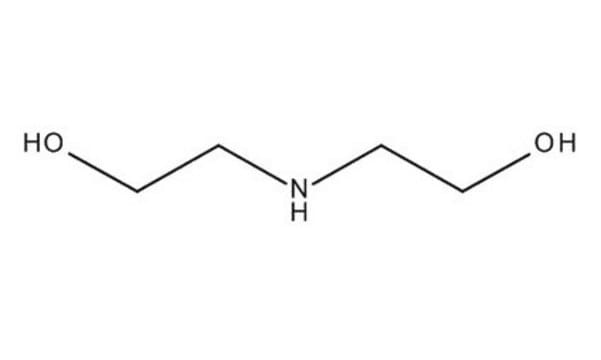D8885
Diethanolamine
reagent grade, ≥98.0%
Synonym(s):
2,2′-Iminodiethanol, Bis(2-hydroxyethyl)amine
About This Item
Recommended Products
grade
reagent grade
Quality Level
vapor density
3.6 (vs air)
vapor pressure
<0.98 atm ( 100 °C)
Assay
≥98.0%
form
solid or viscous liquid
autoignition temp.
689 °F
expl. lim.
10.6 %
color
clear
refractive index
n20/D 1.477 (lit.)
pKa (25 °C)
8.88
bp
217 °C/150 mmHg (lit.)
mp
28 °C (lit.)
density
1.097 g/mL at 25 °C (lit.)
functional group
amine
hydroxyl
SMILES string
OCCNCCO
InChI
1S/C4H11NO2/c6-3-1-5-2-4-7/h5-7H,1-4H2
InChI key
ZBCBWPMODOFKDW-UHFFFAOYSA-N
Looking for similar products? Visit Product Comparison Guide
Related Categories
General description
Application
- As a solvent and stabilizer to synthesize zinc oxide (ZnO): indium (In) thin film, which was employed as photoanode in dye synthesized solar cell (DSSC).
- To prepare diethanolamine substrate buffer.
- To prepare a pH10 buffer solution along with MgCl2 for the incubation of cell lysates extracted from astrocyte cultures.
- Preparation of disodiumiminodiacetic acid by dehydrogenation.
- As a solvent and reactant in triazine based dendrimer synthesis.
- Preparation of diethanolamine ionic liquids employed in green Heck reaction.
Signal Word
Danger
Hazard Statements
Precautionary Statements
Hazard Classifications
Acute Tox. 4 Oral - Eye Dam. 1 - Repr. 2 - Skin Irrit. 2 - STOT RE 2 Oral
Target Organs
Kidney,Liver,Blood
Storage Class Code
11 - Combustible Solids
WGK
WGK 2
Flash Point(F)
280.4 °F - closed cup
Flash Point(C)
138 °C - closed cup
Personal Protective Equipment
Choose from one of the most recent versions:
Already Own This Product?
Find documentation for the products that you have recently purchased in the Document Library.
Customers Also Viewed
Our team of scientists has experience in all areas of research including Life Science, Material Science, Chemical Synthesis, Chromatography, Analytical and many others.
Contact Technical Service







